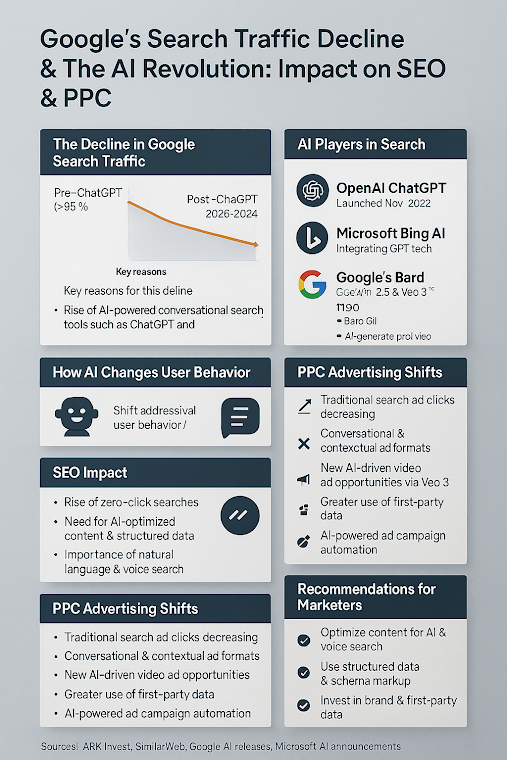Why Google’s Search Dominance Is Slipping: The Impact of ChatGPT, Bing AI, Gemini 2.5, and Veo 3
 |
| Why Google’s Search Dominance Is Slipping: The Impact of ChatGPT, Bing AI, Gemini 2.5, and Veo 3 |
Is Google Losing Its Grip? The Rise of AI Search Tools
For more than two decades, Google has been the undisputed king of internet search. Its search algorithm shaped the way the world accessed information — making Google synonymous with “search.” But the digital landscape is shifting rapidly. Since the launch of ChatGPT by OpenAI in November 2022, Google’s once unshakeable dominance is showing signs of strain. A compelling graph by ARK Invest, based on SimilarWeb data, reveals a subtle but undeniable decline in Google’s share of global search traffic. Google’s traffic share dropped from roughly 99% pre-ChatGPT to closer to 95-96% by early 2024 — a seemingly small dip with outsized consequences. Chapter 1: Understanding the Decline in Google Search TrafficFrom early 2021 to late 2022, Google maintained an iron grip on global search traffic. But post-November 2022, ChatGPT’s emergence as a conversational AI fundamentally shifted user behavior.
Chapter 2: The Power of Conversational AI in SearchAI search tools don’t just deliver a list of links — they provide synthesized, context-aware answers, explanations, and recommendations. This human-like interaction transforms search into a dialogue rather than a query-result transaction.
Chapter 3: Bing’s Unexpected RevivalOnce an also-ran, Bing leveraged OpenAI’s tech to leapfrog into relevance.
Chapter 4: Google’s Counterattack – Gemini 2.5 and Veo 3Google’s Bard was only the first step. Gemini 2.5, released in early 2024, represents a major leap:
Chapter 5: What This Means for SEOThe rise of AI fundamentally changes how content is discovered and consumed.
Chapter 6: Implications for Content CreatorsCreators must now:
Chapter 7: The Impact of AI-Powered Search on PPC AdvertisingGoogle’s search evolution also disrupts paid advertising: 1. Decline in Traditional Search Ad ImpressionsAI chatbots and summarized answers mean fewer users click on traditional ads — PPC campaigns may see fewer impressions and clicks. 2. Shift Toward Conversational and Contextual AdsAds will integrate more naturally into AI conversations, requiring relevance, personalization, and subtlety. 3. New Ad Formats and Placements
4. Greater Emphasis on First-Party Data and PrivacyWith growing privacy regulations and AI’s reduced reliance on third-party cookies, advertisers must invest heavily in first-party data. 5. Increased Competition and CostsLimited AI-ad space could raise bidding costs for premium placements. 6. AI-Powered PPC ManagementAutomated AI tools will optimize bidding, audience targeting, and ad copy, making PPC campaigns smarter and more efficient. Chapter 8: Challenges Ahead
Chapter 9: Recommendations for Businesses and Marketers
Final Thoughts: The Paradigm ShiftGoogle’s decline in search share isn’t just a dip — it’s a tectonic shift. The future of search is no longer about links, but about intelligent conversations, contextual answers, and integrated multimedia experiences. For businesses, marketers, and content creators, adapting to this new AI-driven search ecosystem is critical — from SEO to PPC, from content creation to customer engagement. Google’s Gemini 2.5 and Veo 3 demonstrate the company’s commitment to innovation, but ChatGPT, Bing AI, and other AI-first players have permanently altered the search landscape. The question isn’t whether Google will remain relevant — it will — but how we adapt to a future where AI defines how we find and interact with information. |



Comments